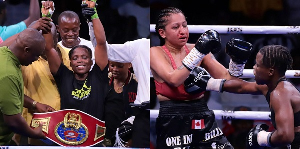A decade ago, after then President Rawlings physically assaulted the Vice-President, I wrote an Op-Ed on the above. I return to this topic again because of the public quarreling of John and John, the President and his predecessor. This is an appropriate topic with which to begin my blog at www.arthurkkennedy.com
To put it bluntly, the ceaseless feuding between Ex-President Rawlings and President Kufuor is prejudicial to Ghana’s interest. Here is why.
First, as a nation whose memory has been scarred by the history of coups, our morale is inevitably disturbed by the shrill exchange of charges between our two most prominent citizens. This is particularly so when the former president has been associated with coups in the past.
Second, while the President works tirelessly to attract Foreign Direct Investments (F.D.I.), most foreign investors look for stability in a country they plan to invest in. Reports or evidence of the President and former President trading accusations and the military brass re-iterating its loyalty to the current government makes them less likely to invest in Ghana and thus retards our economic growth.
Third, the energy and time focused on their quarrels saps the will and focus that our leaders and institutions need to work on our development. There has been a lot of finger pointing between supporters of the two Presidents on who is to blame for the state of their relationship and this has divided along partisan lines. This is unfortunate. It is one in a long line of problems that have nothing to do with parties, including the cocaine scandal.
The former President, right from day one, has not been supportive of his successor. He has been critical of him both at home and abroad. Indeed, he has accused Britain and United States of propping the Kufuor administration up unfairly. This accusation is strange when one recalls how the West, particularly President Clinton was supportive of President Rawlings. Furthermore, he has accused the Kufuor administration of human rights abuses in a manner that given his own well-chronicled abuses is audacious. He has studiously refused to give the President credit for anything.
If all this gives anyone the impression that I think the President is blameless, that is false. True, in dealing with a confirmed two-time coup-maker, the President has more than ample reason to be wary. However, he has shown some lapses in judgment and decorum while dealing with President Rawlings. To focus just on the current controversy, a campaign appearance was not the proper forum to accuse the former President of planning a coup. Indeed, the only appropriate place for such an accusation should have been in a Ghanaian courtroom, by a prosecutor!
The situation is unnecessarily exacerbated by my-boss-is-right supporters and advisors forever re-echoing whatever their hero has said in blatant disregard of the nation’s interest.
Historically, some nations have benefited a lot from collaborative relationships between their leaders and their predecessors. One example will suffice. In 1985, US President Reagan met with Ex-President Nixon who was planning to visit the new Soviet leader Michael Gorbachev in Moscow. They talked about the Soviet Union in general. When Mr. Nixon met Gorbachev, he told Mr. Gorbachev of how much Mr. Reagan respected him and looked forward to working with him, with a little embellishment. Of course, with that opening, Gorbachev also had some positive things to say. When Mr. Nixon returned, he reported on his trip to President Reagan in terms perhaps more positive than warranted by the facts. That visit by President Nixon is seen as one of the critical catalysts to the Reagan-Gorbachev collaboration that ended the Cold War. This was an example of a former President helping a successor to advance his nation’s interest. That is the true measure of a patriot.
We need our ex-President to be supportive of the current President. We need our President to exercise more circumspection in reacting to the tantrums of his often-misguided predecessor. Our nation’s interest requires it. Here is how to approach the situation.
First Mr. Rawlings must, in keeping with the temperament required of his status, pledge NEVER to criticize the President personally in public and acknowledge that he, like every Ghanaian is not above the law.
Second, the President must be mindful of how he addresses sensitive national issues. A leader communicates in words as well as deeds and in certain situations, deeds may be more appropriate than words.
Third, the Armed Forces and Security Agencies must resist the temptation to be drawn into these verbal exchanges. Issuing a statement to re-affirm loyalty to the government each time there is an incident only underlines how fragile our democracy is. If there is evidence that the former President is plotting a coup, the place to address that is in court.
Fourth, the advisors of the two protagonists must counsel restraint and conciliation rather than confrontation whenever there is thorny issue between their bosses. Fifth, the Press must exercise judgment in reporting the pronouncements of our leaders. The Press may have a right to publish everything but it is not right to publish everything!
Finally, the guide for all of us, the President, the ex-President, the Press, the armed forces and the public should be our nation’s interest and a clear signal to the two John’s that we expect them to behave as grown-ups.
Ghana Osee Yeee! Yee Yeee!
Politics of Friday, 10 November 2006
Source: Arthur Kobina Kennedy
















